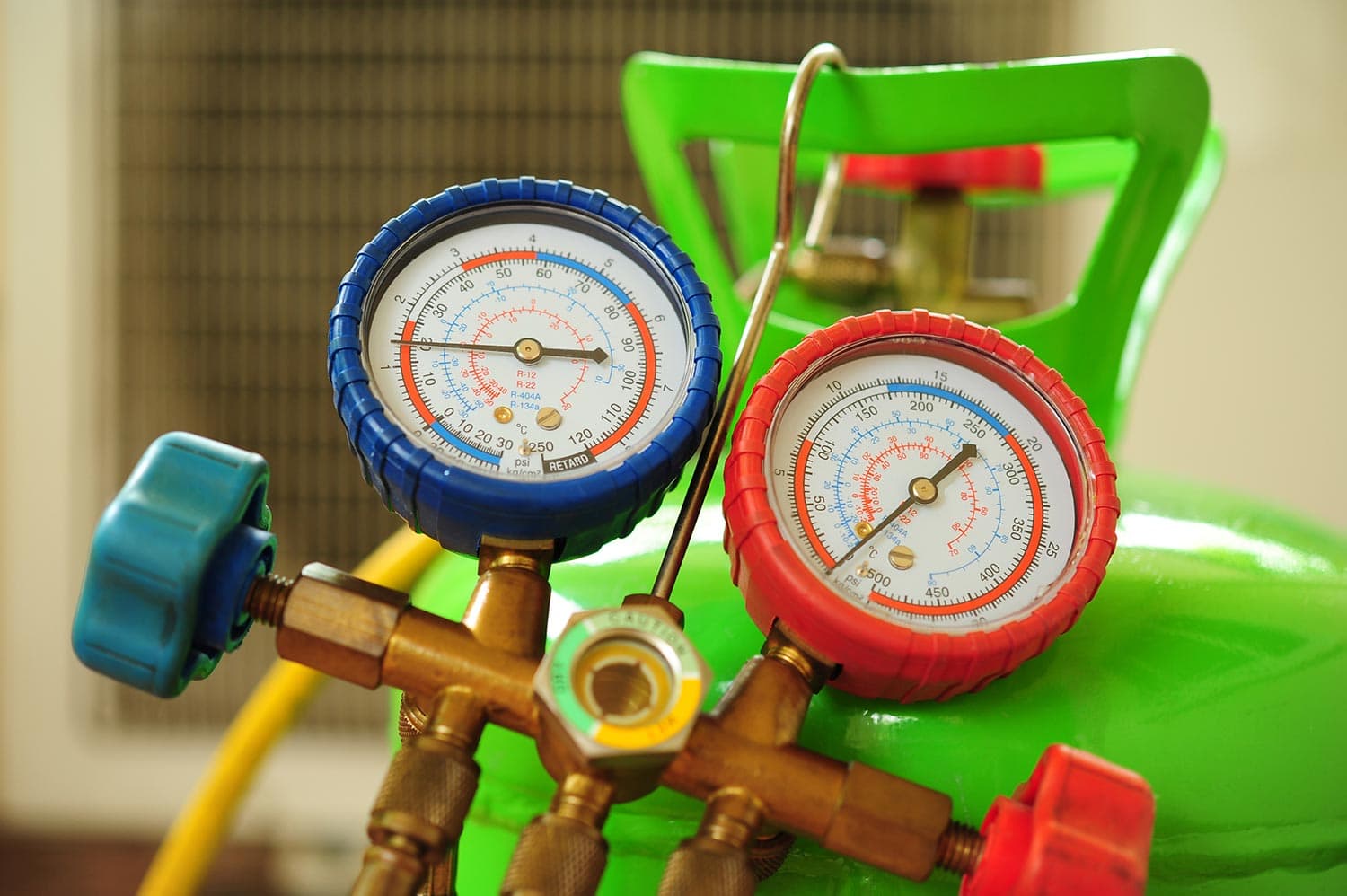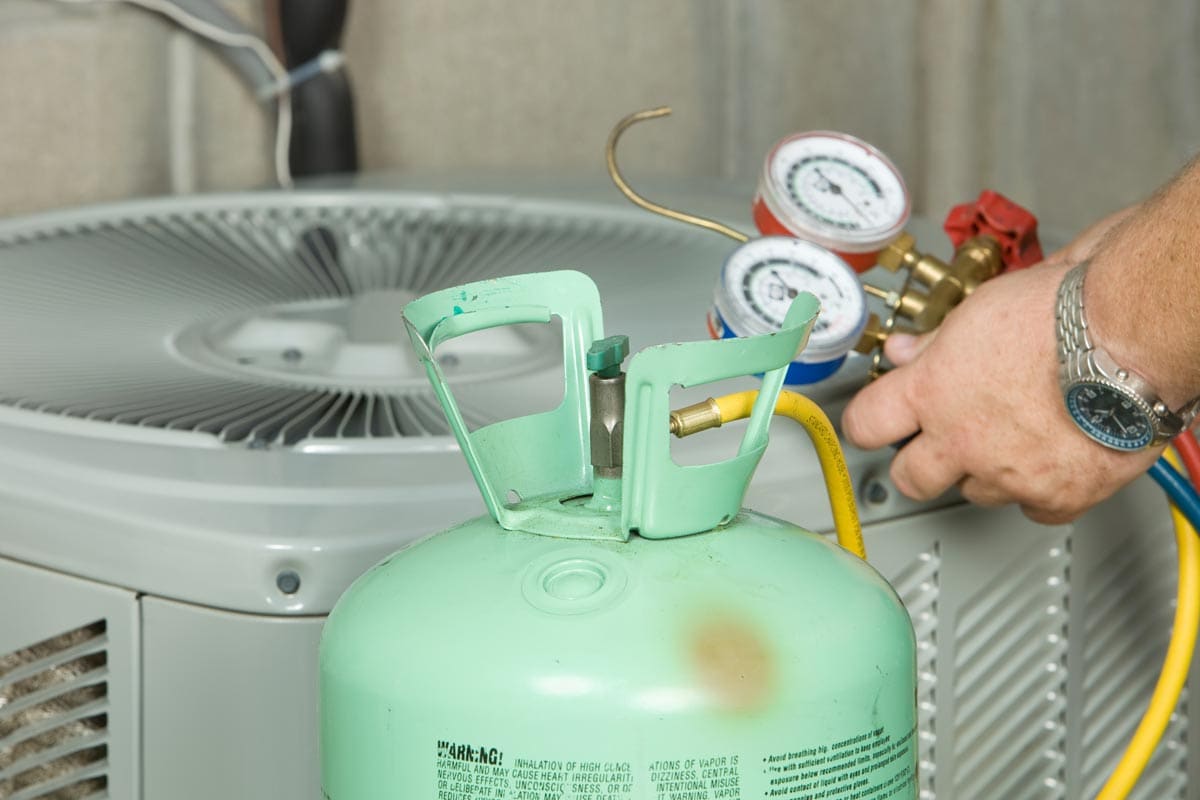If you discovered that your central air conditioner isn't cooling your home the way it used to, the chances are that there could be issues with the system's freon. You may be wondering whether you can check this out yourself, and if so, how to go about it. We have researched how to check the freon level in a central air conditioning unit and whether or not it is recommended.
If you suspect that your central air conditioning unit is low on freon, the best thing for you to do is to call a licensed professional to inspect it if you are not one yourself. Although you can buy leak sniffers, gauges, temperature probes, and other devices, you likely will not have the experience, knowledge, and tools required to diagnose and repair the refrigerant properly. Attempting to do so can be hazardous to yourself and your household.
Some HVAC systems' problems are simple fixes that the average DIYer can fix relatively easily. However, some issues will simply require a skillful diagnosis for proper repair. And though checking your freon level on your own may not be advisable, there are things that you can look for to determine if this is the cause of your air conditioner system issue.

How do you know if your central air conditioner needs freon?
If your air conditioner is low on freon, you may notice it fairly quickly. There are a few signs that the air conditioner will display when it's time for a recharge. Let's take a look at a few of the indicators.

Electric bills are higher than before
It's not unusual to see a spike in your electric bill in the summer due to increased air conditioner usage.
However, if you notice a spike that is larger than normal, this may be a sign that the unit is overworking. And there's a possibility that it's overworking due to either a refrigerant leak or component failure.
There is a buildup of ice on the refrigerant line
If you see a buildup or a block of ice in your refrigerant line, the chances are that the unit has a leak and is low on freon. You may also notice bits of frozen ice around the line's valves.
The unit takes longer than usual to cool your home
If there is a leak of your R22, the ventilated heat through your home won't be absorbed as quickly. This, in turn, makes it increasingly difficult for the air conditioning unit to properly transfer larger quantities of cold air into your home.
It's blowing warm air
The first thing that you'll want to check is the closest vent. If the air conditioner is low on freon, the unit will begin to blow warm air instead of cold air.
To test this, place your hand up against the closest vent to check the air temperature. If the air is still cold, the chances are that the coolant level is fine. But if it's lukewarm, you may want to proceed with the other checks as the refrigerant may be low.
Inspect the blower fan
Go to your thermostat and turn the air conditioner to the "On" position for this test. Next, go out to your air conditioner unit and visually inspect the blower fan in the back of the unit. The fan should be moving.
If it doesn't start moving after you've turned on the unit, the chances are that it could be a fan, motor, or electrical issue and not a freon issue.
And of course, you never want to place your hand inside of the fan, as it could be hazardous. The best thing to do would be to call a professional technician to diagnose why the fan isn't working.
Clogged air filter
Many people underestimate how badly a clogged air filter can totally throw off a central air system. Not only can it restrict airflow, but it can cause your air conditioner to work harder.
This, in turn, can cause the compressor to burn out prematurely. When this happens, the entire system will fail to operate. Be sure to check your filter at least once a month and replace or clean it as needed.
Frozen evaporator coils
Though it may sound counterproductive, a unit that is low on refrigerant will often have frozen evaporator coils. This is due to the low pressure caused by the low refrigerant levels.
The low Freon level will lower the temperature in the evaporator coils, causing it to freeze inside of them. And if this happens, you may find that the coils are completely covered with ice due to the surrounding moisture in the air outside.
Hissing sound coming from the unit
You can also listen out for any hissing sound coming from the air conditioning unit itself. If the freon level is low, it more than likely is due to a leak.
If the leak is relatively large, you will hear a bubbling or slight hissing sound coming from the unit as the freon escapes through the refrigerant line or valves.
The sound could come from a number of different components around the line, so try to listen in different areas to pin down the leak area.
Buy an electronic leak detector
Modern technology has also brought about more sophisticated ways to detect leaks in your air conditioning unit.
There are now electronic detectors that can sniff out a freon leak in your system. If there is a leak, the detector will display a visual indicator or emit a beep as an indicator.
Be sure to read the instructions on the detector before utilizing it, as many may not be as reliable as others—especially in certain weather conditions.
However, a diagnosis from an experienced HVAC technician is always recommended, as they have more reliable and professional equipment.
Can I recharge my home AC myself?
Though you can recharge your air conditioner yourself, it's really not recommended. Chances are unless you're an HVAC professional, you may not have the tools, knowledge, and experience necessary to perform the task.
If you do attempt to perform this task yourself, be sure to gather as much knowledge as possible, and even doing a quick consult with a licensed professional HVAC technician can be helpful.
Need a visual on how HVAC pros check freon levels? Check out this video:
Why is my air conditioner running but not cooling the house?
There could be a number of things causing the air conditioner to run without actually cooling the temperature in the home.
Chances are that the motor is working fine, but another component issue is causing we are to fail to cool. Often this is caused by low refrigerant levels, faulty thermostats, clogged air filters, or frozen evaporator coils.
How often does home AC need freon?
If your AC is running properly, you shouldn't have to add freon to the unit at all. However, the chances are that sometime in the air conditioner's lifetime, it will experience a leak. It is these leaks that will necessitate a recharge.
Air conditioning refrigerant can leak directly from the refrigerant line, faulty or broken valves, or other areas. If you suspect that the refrigerant is low in your air conditioner, try to narrow down other potential issues by doing a bit of troubleshooting.
How much does it cost to put R22 in an air conditioner?

The cost to put R22 in your air conditioning system can range anywhere from $100 to over $300, depending on your area.
You can also purchase freon yourself if you have HVAC experience or feel confident performing this task yourself. The cost for a pound of freon can range from about $100 to over $150.
Is it bad to run AC with low freon?
Yes. Running your AC while the freon is low can be dangerous if there's a large leak in the unit. A large leak in the refrigerant can cause it to seep through the vents in your home, creating a hazardous atmosphere for you and your family members.
This is why it's best to turn off the unit immediately and call an HVAC professional if you suspect that there is a refrigerant leak.
Wrapping Things Up
An air conditioner running on low refrigerant can cause the unit to overwork and malfunction if it is not recharged in a timely manner.
And remember, always check your vents, thermostat, air filter, and blower fan if you suspect that your refrigerant levels are low. Doing so can help you rule out other possible issues.
Before you go, be sure to check out our other posts:

What color is the hour glass outside on a A/C unit supposed to be to check to see if it has Freon?